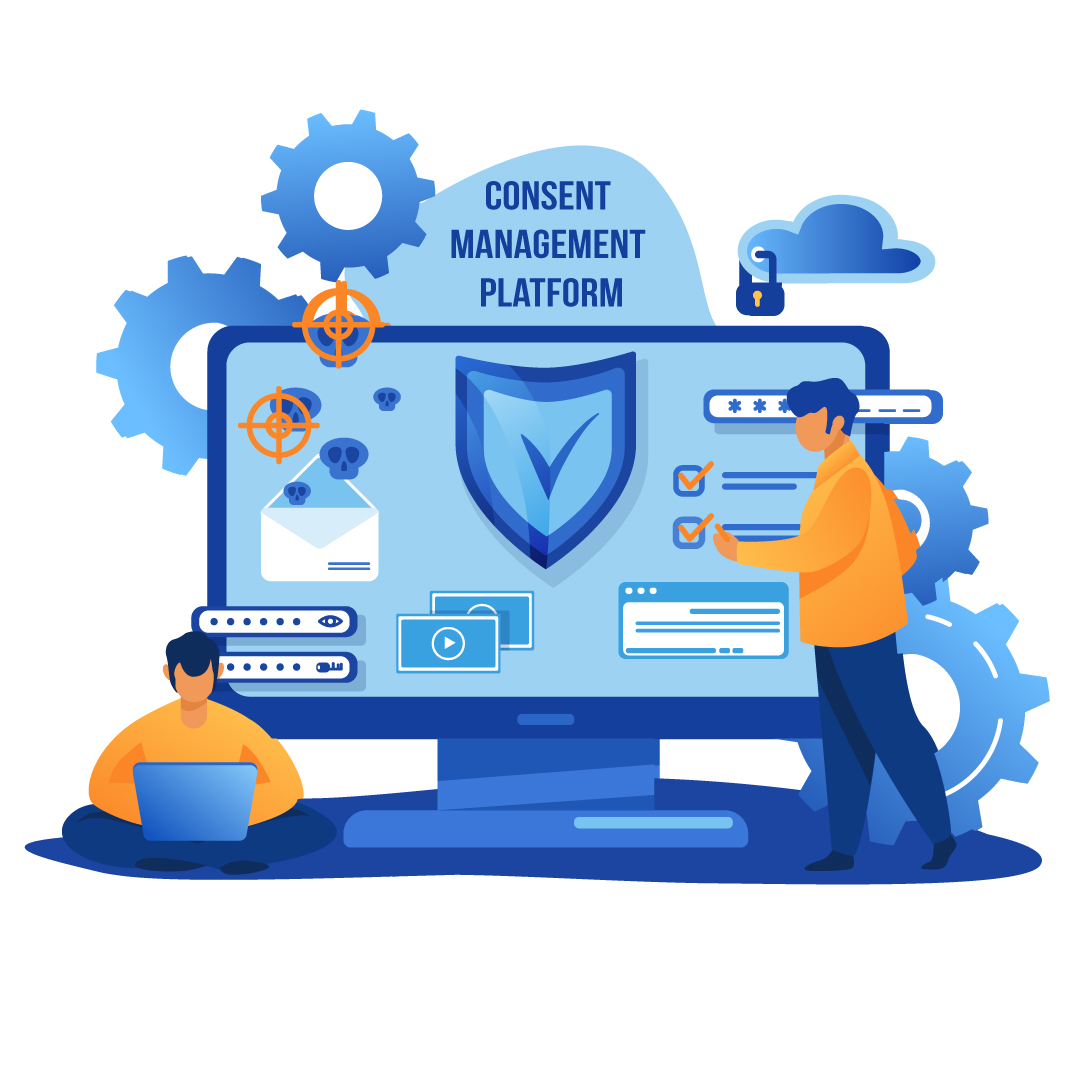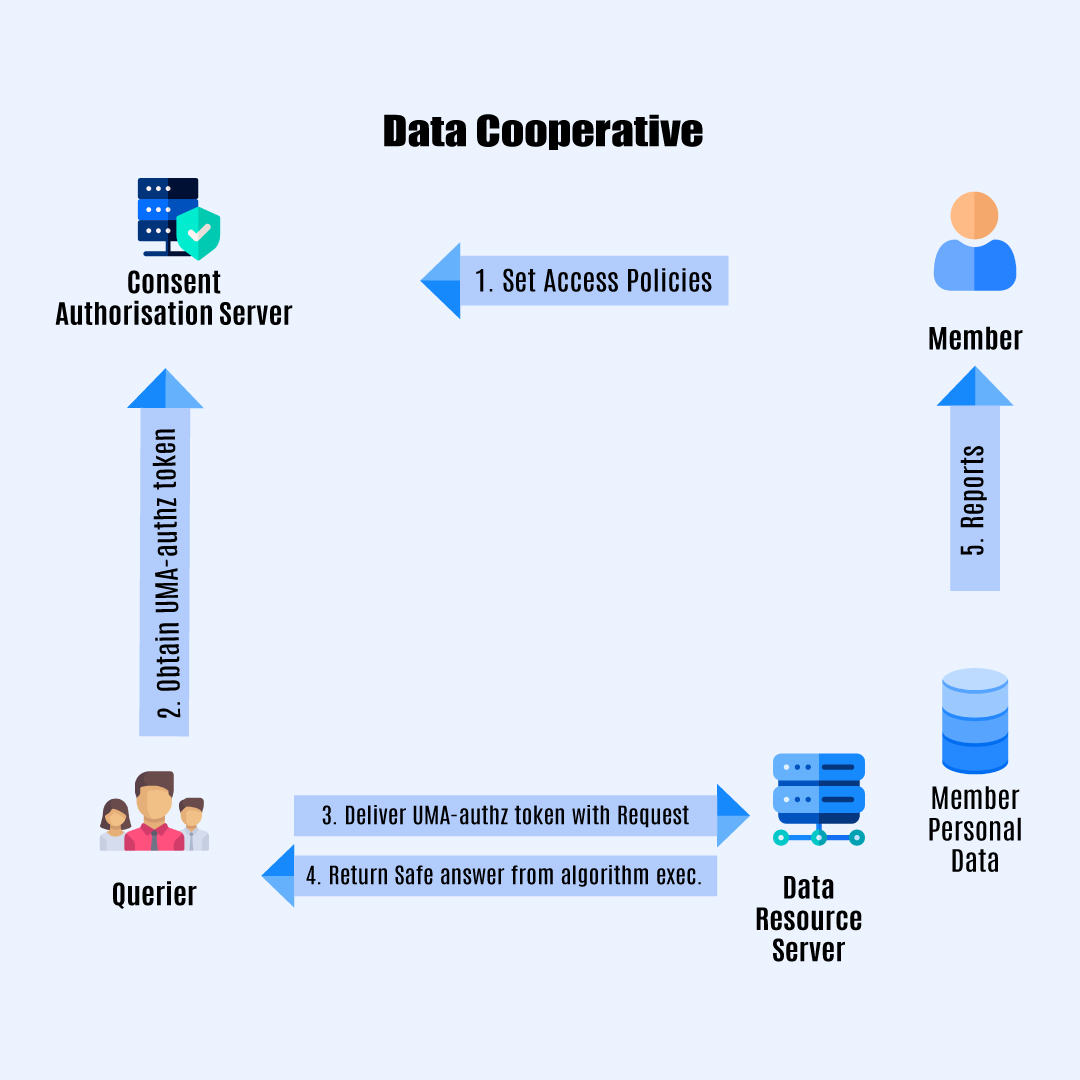Consent Management Platform: How It Helps You Manage Customers’ Data
Are you trying to have a simplified way to meet the technical requirements in the legal process of collecting consent to cookies? If yes, Consent Management Platform (CMP) is the answer.
A Consent Management Platform helps in managing your users’ consent preferences effortlessly while complying with GDPR (Genral Data Protection Regulation).
What happens when you want to use customer data for marketing? Do you have to get consent from every customer? What if they don't like to receive marketing emails? This blog post will discuss consent management and Consent Management Platform, and how you can use your customers' data without violating their privacy. Stay tuned!
What is a Consent Management Platform?

In the era of data privacy, obtaining customer consent has become a key concern for businesses. Fortunately, there are several ways to get started with consent management.
One option is to use a consent management platform (CMP), which can help businesses collect, store, and manage customer consent.
Consent management platform is software that enables the process of consent management to happen smoothly.
It helps websites to collect user consent through cookies while they visit the website. Thus, it helps website to stay GDPR-compliant. It automates the consent management process.
If your business has users from the EU region or you are a service provider base din the EU, you need to adhere to EU regulations. Consent management for GDPR is critical in this case. A Consent Management Platform comes handy in obtaining users’ consent from website for the processing of data. CMP helps companies/publishers to legally document and manage a user’s consent choices ahead of collecting, sharing, or selling user data from websites and apps that use cookies.
What Is Consent Management and Why Do Businesses Need It?
At its simplest, consent management is obtaining and managing consent from individuals. This usually involves collecting personal data from individuals and storing and using that data following their wishes. To do this effectively, businesses need to clearly understand what information they are collecting, why they are collecting it, and how it will be used.
They also need to ensure that they have robust systems or consent management platforms in place for managing consent and that personal data is only used in the ways that individuals have agreed to. When appropriately implemented, consent management can help businesses build trust with their customers and ensure that they comply with data protection legislation.
Here are other top ten reasons why businesses need consent management:
- Compliance with GDPR - One of the critical requirements of GDPR is obtaining valid consent from individuals before collecting, using, or storing their data. Consent must be freely given, specific, informed, and unambiguous. A consent management platform or software will help you obtain and manage consents in compliance with GDPR requirements.
- Increased customer trust - Customers are more likely to trust businesses with transparent and fair policies around personal data usage. Obtaining explicit consent shows your customers that you respect their privacy and are transparent about how you will use their data. This can help to build customer trust and loyalty.
- Improved customer experience - Customers expect a personalized and seamless experience when interacting with businesses. A consent management solution can help you collect the necessary data consent from customers while minimizing disruption to their user experience. This can lead to improved customer satisfaction and increased conversion rates.
- Reduced risk of fines - GDPR imposes significant penalties for organizations that breach data protection regulations, including up to €20 million or four percent of global annual turnover, whichever is greater. A consent management platform can help you avoid these costly penalties by obtaining the necessary consent from individuals before collecting, using, or storing their data.
- Data quality and accuracy - To provide a personalized customer experience, businesses need accurate and up-to-date customer data. A consent management solution can help ensure that the personal data you hold is accurate and up-to-date by allowing customers to update their consents as their preferences change quickly.
- Data subject rights - GDPR gives individuals the right to access, correct, and delete their data. A consent management platform can help you manage these requests efficiently by providing customers with a self-service portal where they can view, update or delete their consents.
- Seamless integration - A CMP should integrate seamlessly with your existing systems and processes. This will minimize the impact on your business and allow you to continue operating as usual while complying with data protection regulations.
- Flexibility and scalability - As your business grows, your consent management solution should be able to scale seamlessly to meet the increasing demands. It should also be flexible enough to accommodate changes in data protection regulations.
- Support and expert advice - A consent management platform should come with support and expert advice from a team of data privacy experts. This will ensure that you are always up-to-date with the latest changes in data protection regulations and can comply with them effectively.
How Can Businesses Get Started With Consent Management?

Businesses can develop their consent management system using WordPress or Drupal. A proficient custom software development company with adequate expertise can help you in this.
Regardless, customers should be allowed to withdraw their consent at any time. Companies can ensure compliance with data privacy regulations and build trust with customers.
A consent management platform is essential for any business that collects, uses, or stores personal data. It helps organizations to be compliant with data protection regulations, build customer trust, improve customer experience and reduce the risk of fines. You can take some time to learn more about consent management in Osano's article.
Best Practices Businesses Can Use to Obtain Consent Management
Businesses increasingly collect customer data, but they often struggle to obtain and manage customer consent. This is especially true for online companies since customers may be located in different jurisdictions. In addition, customers may change their minds about sharing their data or receiving marketing communications.
There are a few best practices that businesses can follow to help obtain and manage customer consent:
- Make it easy for customers to give their consent by providing precise and concise explanations of what they are consenting to
- Allow customers to withdraw their consent at any time and make it easy for them to do so
- Keep track of when and how each customer has given their consent so that you can stop using their data if they withdraw their consent
- Respect customer preferences around communication channels - some people may prefer to receive emails while others may like text messages
- Don't make giving consent a requirement to use your product or service
By following these best practices, businesses can ensure that they respect their customers' wishes and protect their data. In addition, companies can build trust with their customers by making it easy for customers to give and withdraw their consent through efficient consent management platforms. Lastly, by allowing customers to choose how they receive business communications, businesses can show that they value customer preferences.
How to Get Consent From Your Customers in a Way That Meets GDPR Requirements?
The General Data Protection Regulation (GDPR) is a set of regulations that member states of the European Union must implement to protect the privacy of digital data. The law also applies to any company that processes or intends to process the data of individuals in the EU, regardless of whether the company is based inside or outside the EU.
Under GDPR, companies must obtain valid consent from individuals before collecting, using, or sharing their data.
To obtain valid consent, companies must provide clear and concise information about how the data will be used and allow individuals to opt-out of having their data collected or shared. In addition, companies must ensure that individuals have the right to withdraw their consent at any time. Failure to comply with GDPR can result in fines. Companies need to obtain valid permission from customers. Consent management platform is a great solution to this end,
One way to obtain valid consent is to use a checkbox system on your website or mobile app. When an individual visits your website or uses your app for the first time, they should be presented with a clear explanation of how you will be using their data. They should then be given the option to agree.
Best Practices for Implementing Consent Management
We've listed out top best practices for implementing consent management into any business operations.
It’s essential to have a clear understanding of what consent means before implementing any changes.
Consent is an individual’s voluntary agreement to allow someone to do something, such as collect and use their data.
This agreement can be withdrawn at any time and must be given freely – without coercion, manipulation, or deception.
There are a few key things to keep in mind when it comes to consent:

- Consent must be specific – It should cover all the details of what you’re asking permission to do. This includes specifying why you want to collect the data, how it will be used, and how long it will be kept.
- Consent must be informed – Individuals should know precisely what they agree to. This means being transparent about why you want the data and what you’ll do with
- Consent must be freely given – People should feel like they have a choice in whether or not they give their consent. If they feel pressured into saying yes, then it’s not truly voluntary.
There are a few other best practices to keep in mind when collecting consent:
- Make it easy for people to withdraw their consent – It should be just as easy for someone to say no as it was for them to say yes in the first place. -Keep records of when and how consent was given – This will help you track who had consented to what and when they did so. -Be prepared to change your consent process – As your business grows and changes, so will the way you collect and use data. Be prepared to adapt your consent process as needed.
- Don’t make consent a condition of using your service – People should be able to use your service even if they don’t want to give their consent. Forcing them to do so is unethical and could lead to legal problems down the road.
By following these best practices, you can be sure that you’re collecting consent in a legal, ethical, and respectful way of people’s rights. Implementing these changes can help build trust with your customers and clients, which is essential for any business.
Conclusion
As a business owner, you want to use your customers' data to benefit them and your company. But how can you do that? Consent management is one way to use your customers' data while keeping their best interests in mind. Are you planning to embed a consent management platform into your website or mobile app? or are you looking to build a custom consent management platform? Get help from experts.


